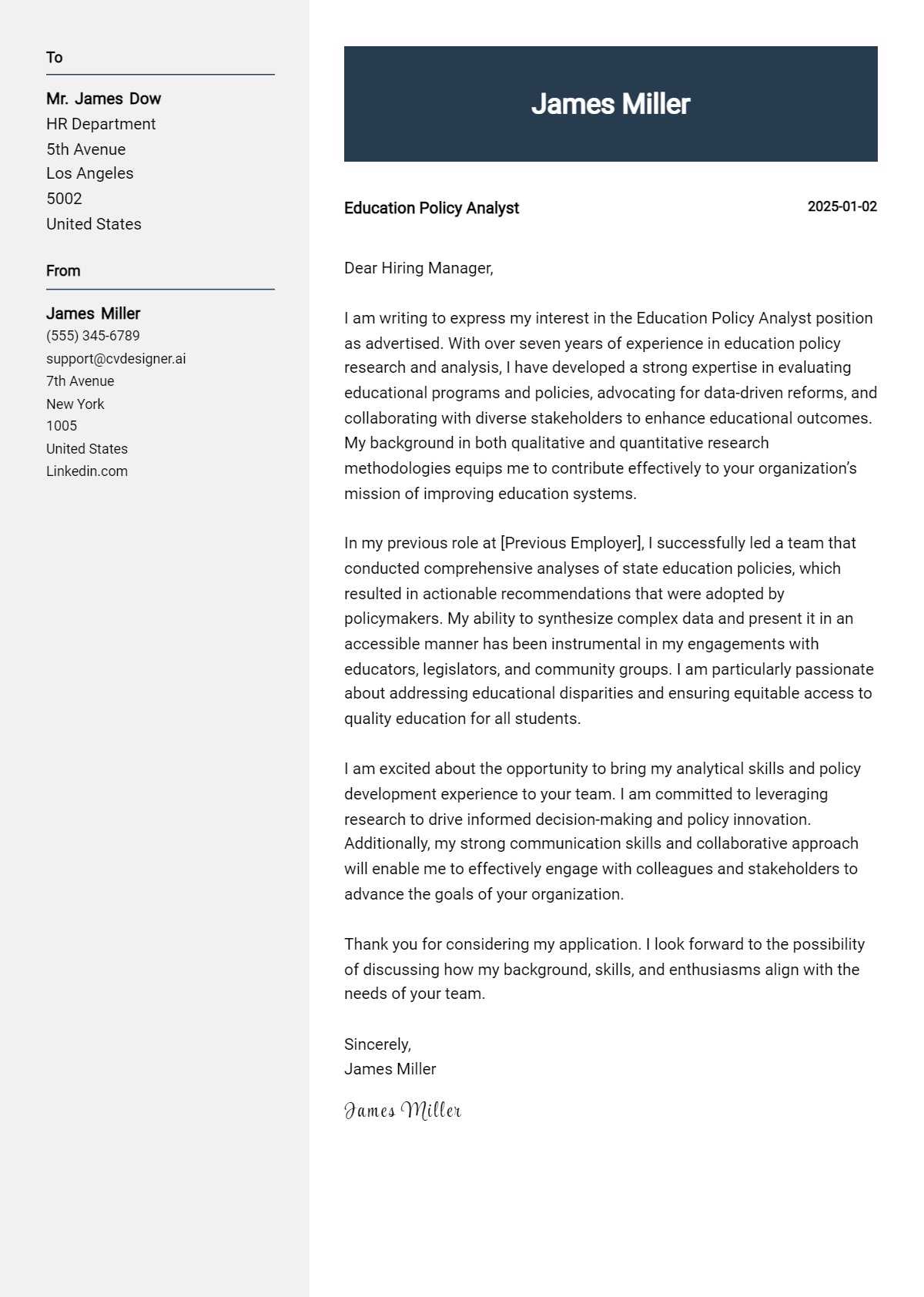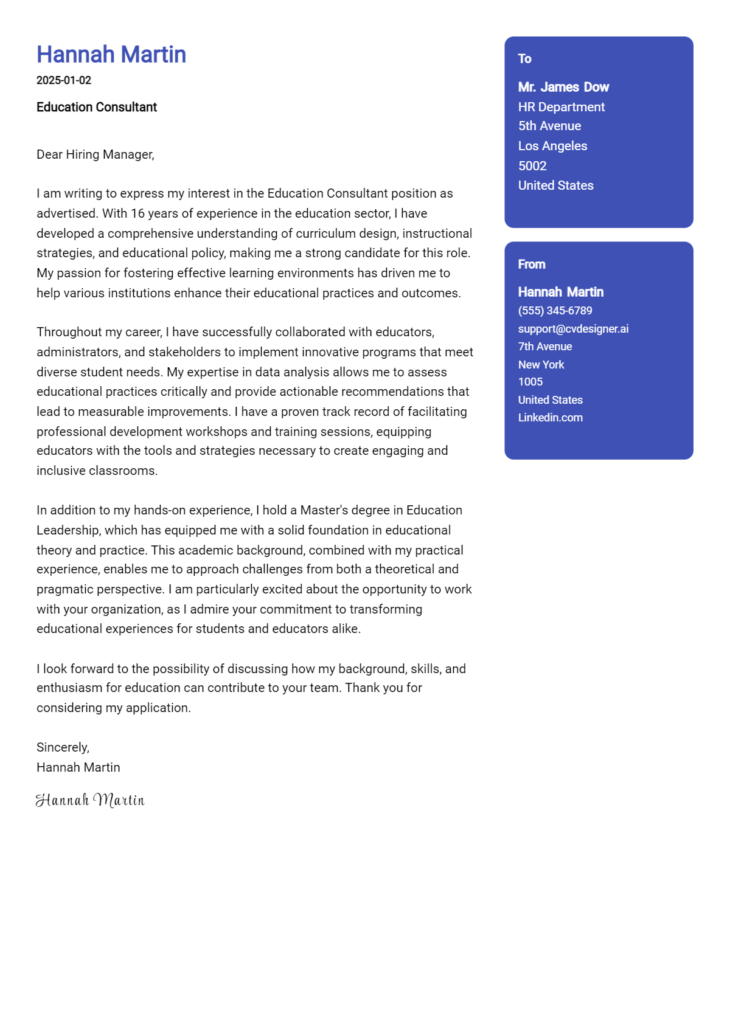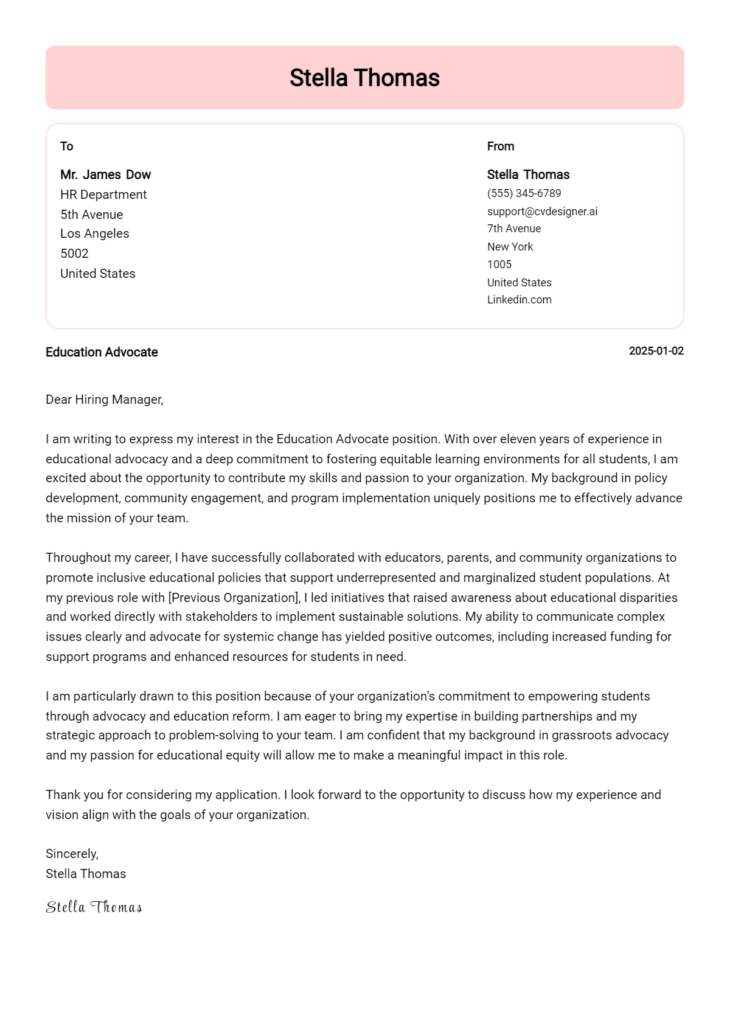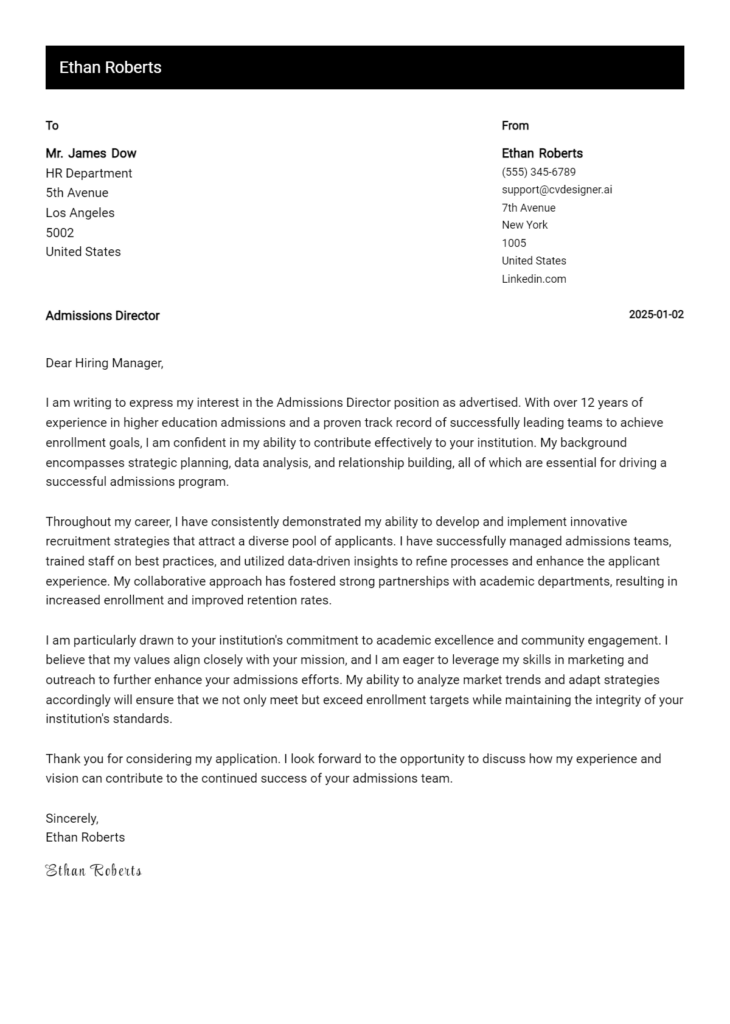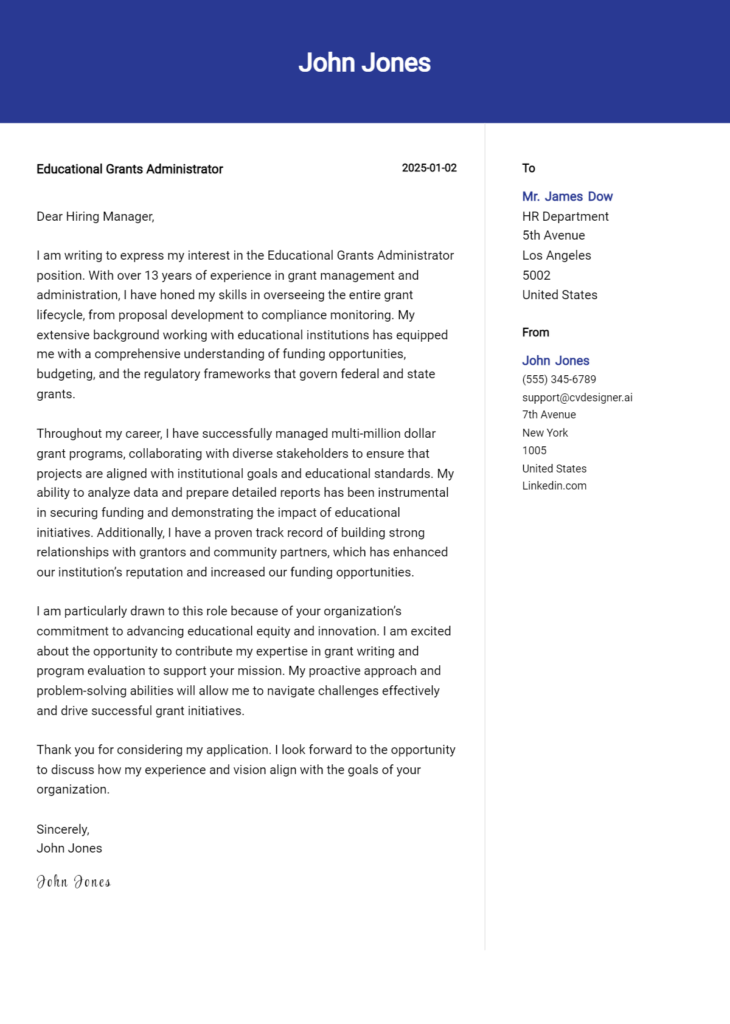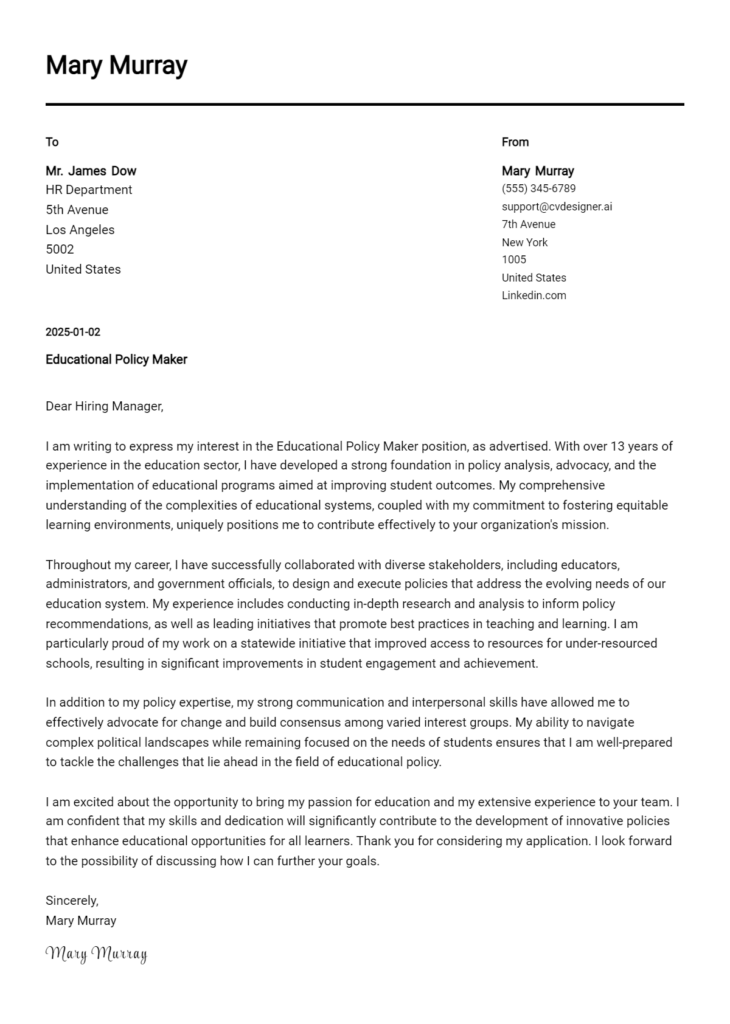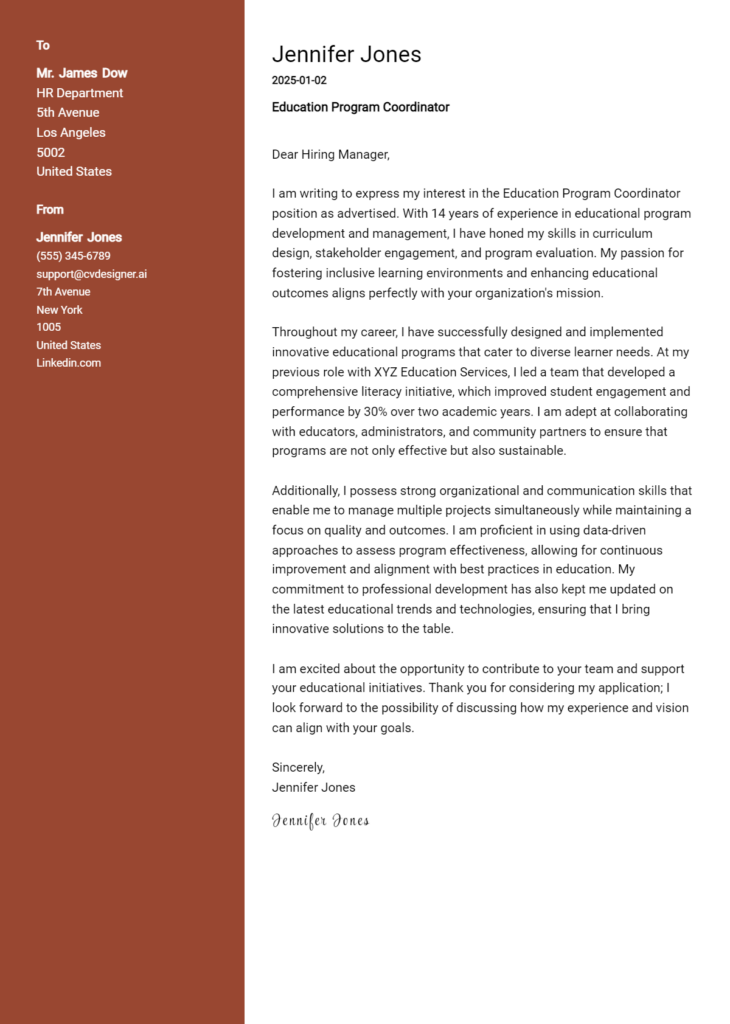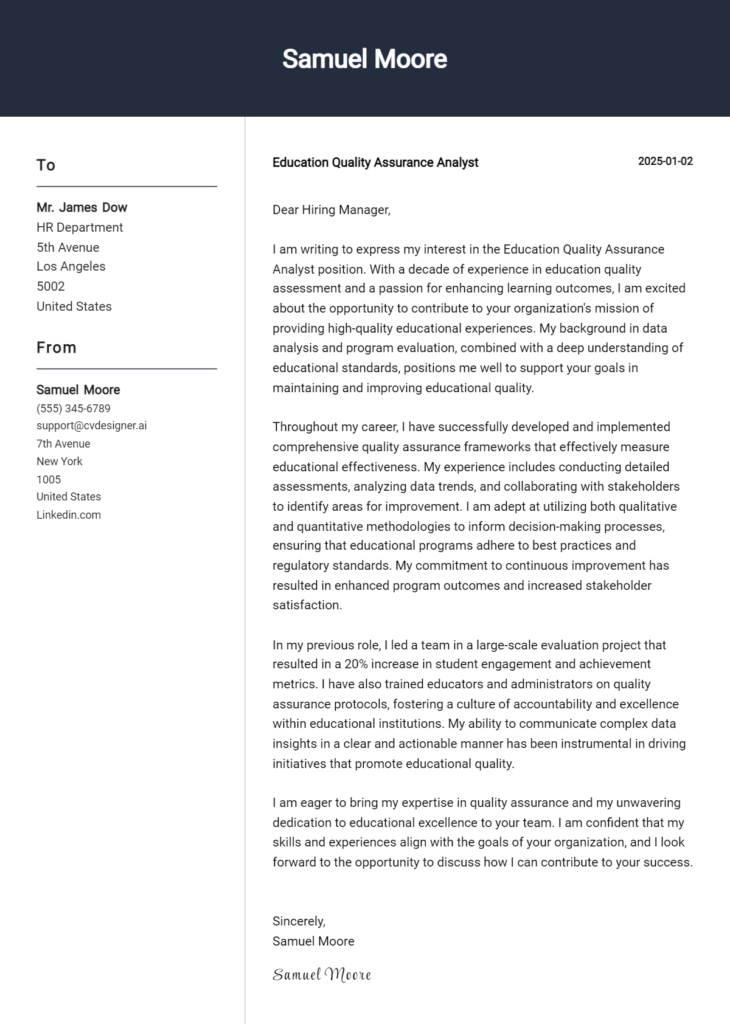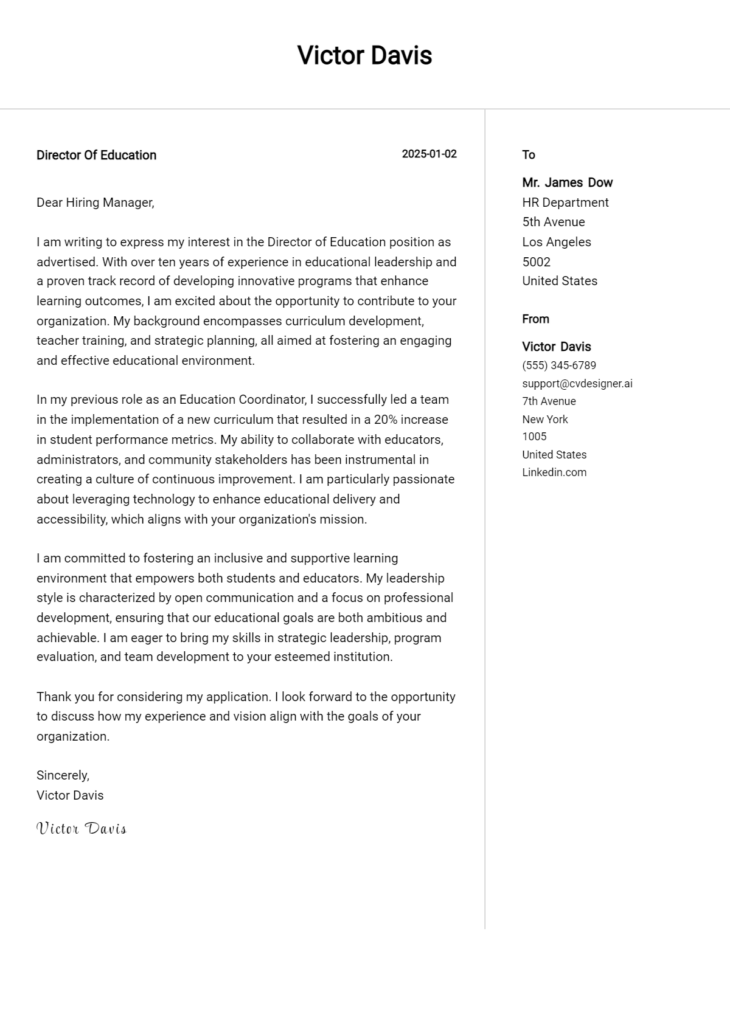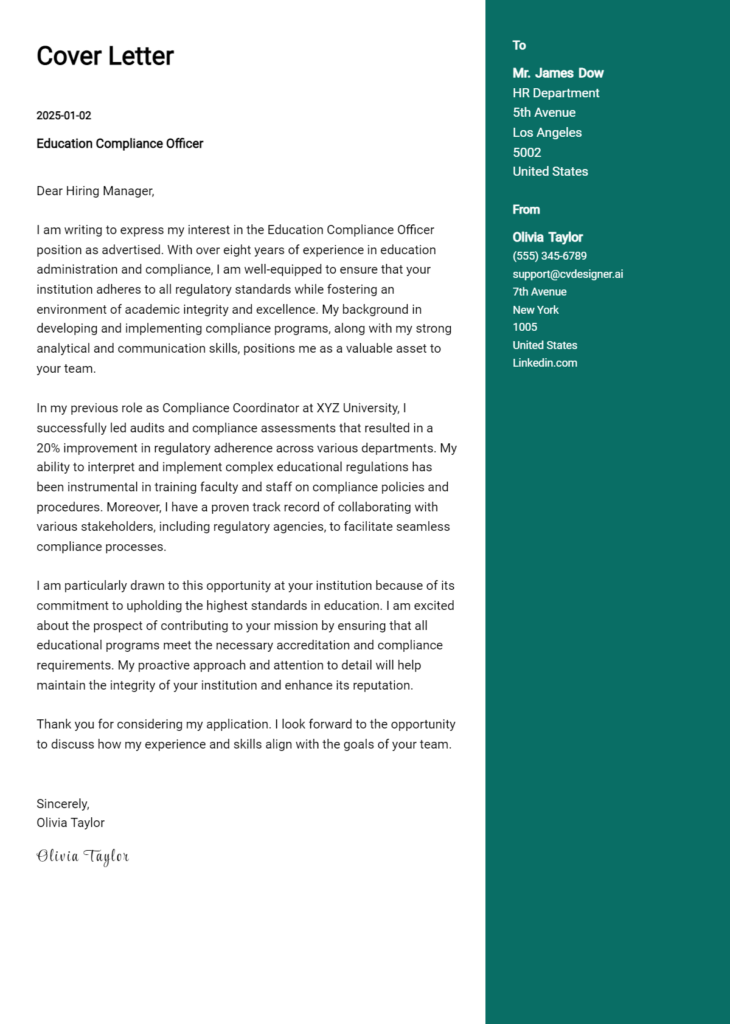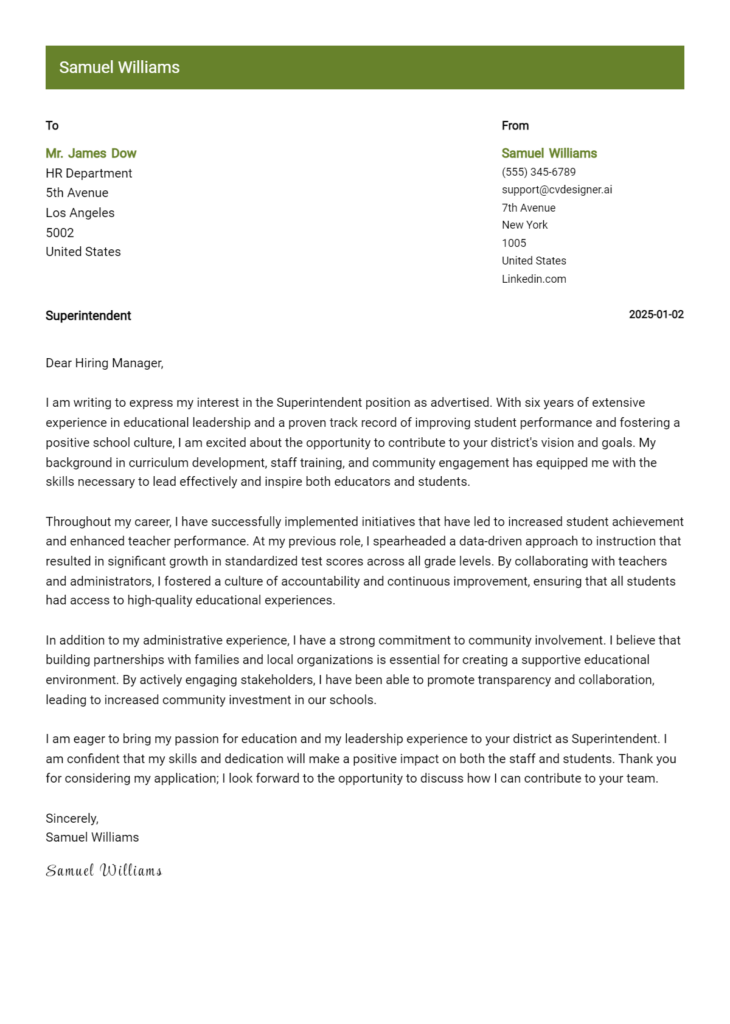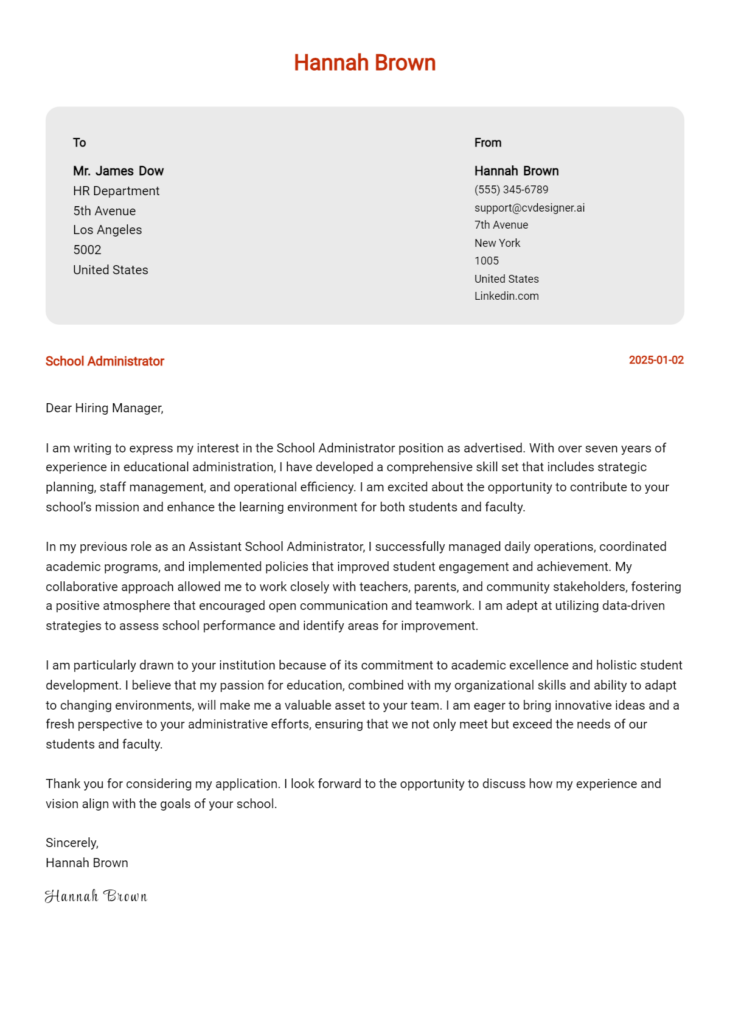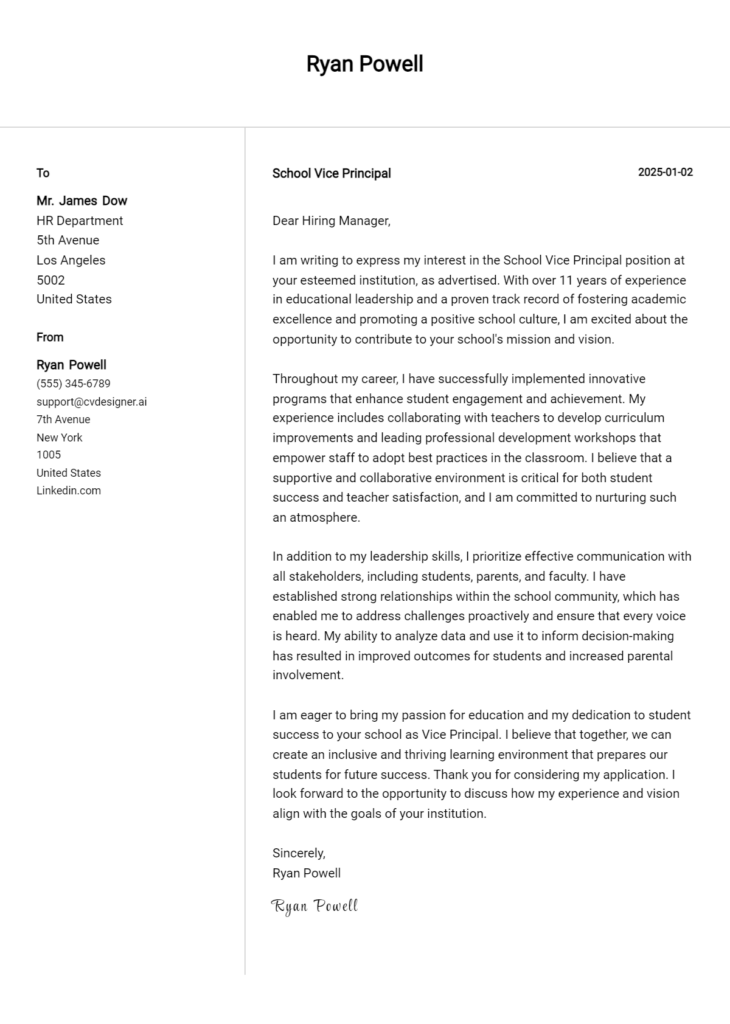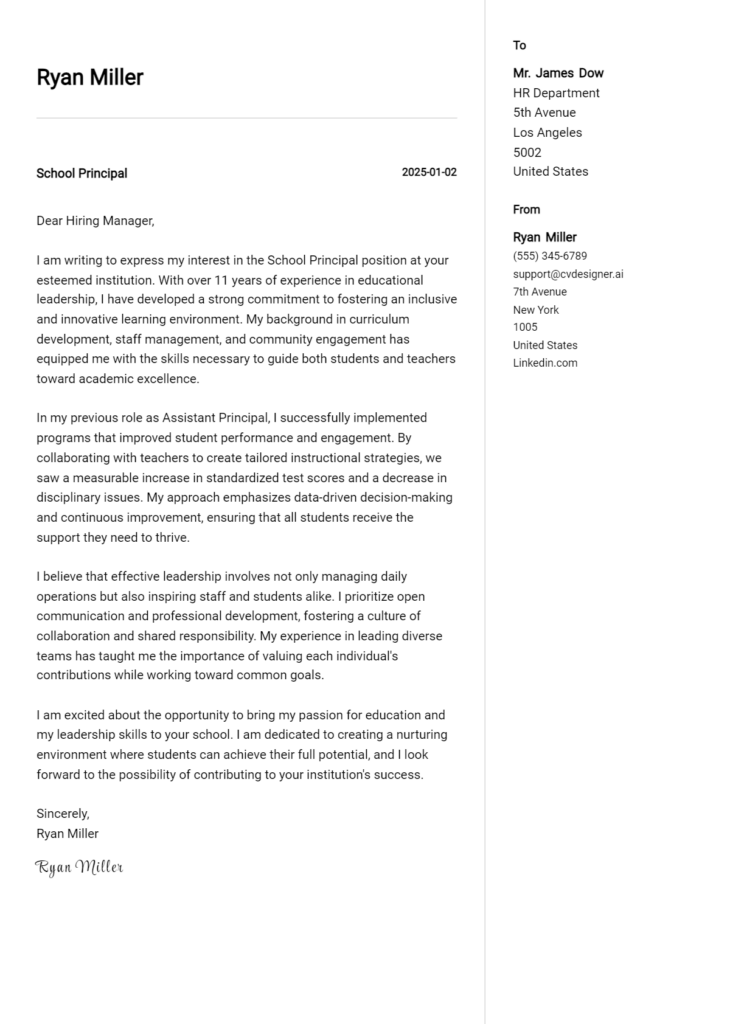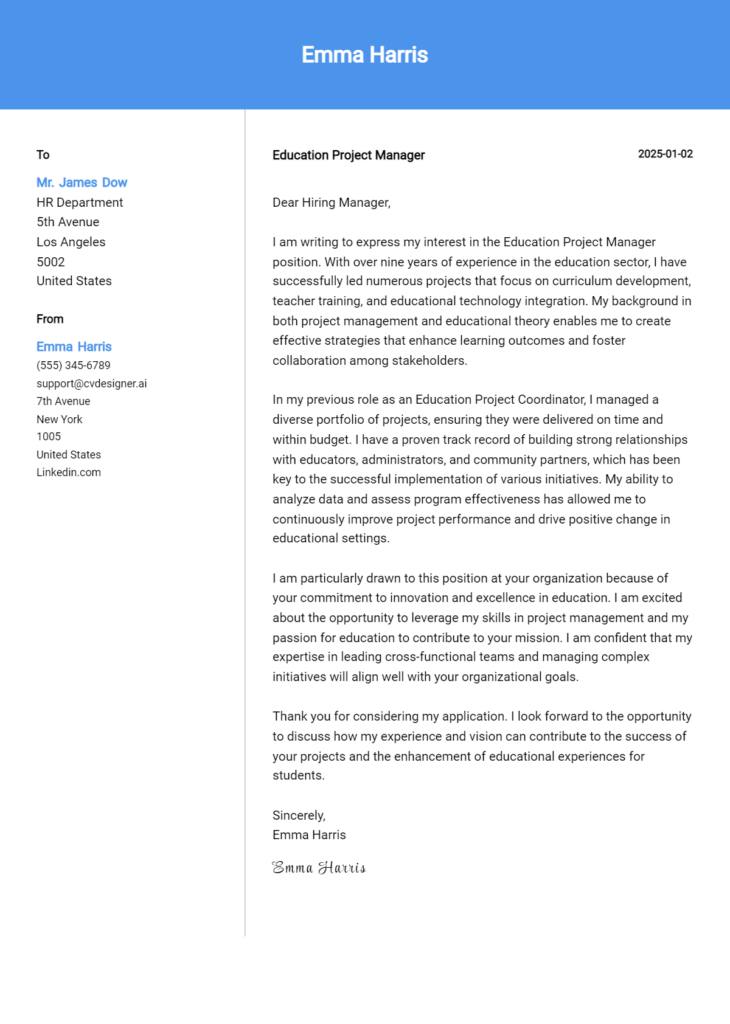Education Policy Analyst Cover Letter Examples
Explore additional Education Policy Analyst cover letter samples and guides and see what works for your level of experience or role.
How to Format an Education Policy Analyst Cover Letter
Crafting a well-structured cover letter is essential for an Education Policy Analyst, as it not only showcases your expertise but also demonstrates your ability to communicate effectively—a key skill in the field of education policy. A thoughtfully formatted cover letter allows you to present your qualifications in a clear and organized manner, helping to capture the hiring manager's attention while underscoring your analytical and strategic thinking abilities.
In this guide, we will outline how to structure your cover letter, providing insights and education policy-specific examples to assist you in creating a persuasive document.
We'll focus on the essential components of a professional cover letter, including:
- Cover Letter Header
- Cover Letter Greeting
- Cover Letter Introduction
- Cover Letter Body
- Cover Letter Closing
Each section is crucial in emphasizing your qualifications and professionalism. Let’s break down each part and explain how to make your Education Policy Analyst cover letter stand out.
Importance of the Cover Letter Header for an Education Policy Analyst
The cover letter header is a critical component of any job application, particularly for an Education Policy Analyst, as it sets the tone for professionalism and clarity. A well-structured header not only presents essential contact information but also establishes a formal introduction to your candidacy. It should include your name, address, phone number, email, the date, and the recipient's details, ensuring that all parties can easily connect. A clear and professional header reflects attention to detail and respect for the hiring process, which are vital traits in the field of education policy.
Strong Example
John Doe 123 Education Lane Policy City, ST 12345 (123) 456-7890 johndoe@email.com October 1, 2023 Ms. Jane Smith Hiring Manager Education Policy Institute 456 Knowledge Blvd Research Town, ST 67890
Weak Example
John (123) 456-7890 10/1/23 To Whom It May Concern
The Importance of the Cover Letter Greeting
The greeting of your cover letter serves as the first impression to your potential employer, setting the tone for the rest of your application. A well-crafted greeting reflects professionalism and demonstrates a personal touch by directly addressing the hiring manager. This approach shows that you have taken the time to research the organization and its personnel, which can significantly enhance your credibility as a candidate. To avoid generic greetings, such as "To Whom It May Concern," it's beneficial to seek out the recipient's name through the company's website or LinkedIn profiles. A personalized greeting not only grabs attention but also establishes a connection that can resonate throughout the letter.
Strong Example
Dear Dr. Jane Smith,
Weak Example
To Whom It May Concern,
The Importance of a Well-Crafted Cover Letter Introduction for an Education Policy Analyst
A well-crafted cover letter introduction is crucial for an Education Policy Analyst as it serves as the first impression to the hiring manager. This opening paragraph should capture attention, convey genuine interest in the position, and highlight key skills or achievements that align with the role. A strong introduction not only sets the tone for the rest of the application but also establishes the candidate's credibility and enthusiasm for contributing to educational policy reforms. Below are examples of strong and weak introductions to illustrate the difference.
Strong Example
Dear [Hiring Manager's Name], I am excited to apply for the Education Policy Analyst position at [Company Name], where I can leverage my extensive background in educational research and policy development to advocate for equitable learning opportunities for all students. As a graduate of [University Name] with a Master’s in Education Policy and over five years of experience working with state education agencies, I have successfully led initiatives that improved student outcomes and informed legislative decisions. I am eager to bring my analytical skills and passion for educational equity to your esteemed team.
Weak Example
To Whom It May Concern, I am writing to express my interest in the Education Policy Analyst position. I have some experience in education and think I could do this job. I have worked in various roles, but I am not sure if they are directly related to policy analysis. I hope you will consider my application.
Purpose of the Cover Letter Body for an Education Policy Analyst
The body of a cover letter for an Education Policy Analyst serves as a critical component where candidates can effectively showcase their relevant skills, experiences, and the unique value they bring to the organization. This section allows the applicant to discuss specific projects or accomplishments that demonstrate their expertise in education policy analysis, data interpretation, and strategic planning. By highlighting past successes, such as leading initiatives that improved educational outcomes or conducting impactful research that influenced policy changes, candidates can make a compelling case for why they are the ideal fit for the role. A well-crafted body not only reflects the candidate's qualifications but also their passion for education reform and their commitment to advancing effective policies.
Strong Example
In my previous role at the State Department of Education, I led a team that conducted a comprehensive analysis of the state's funding allocation for underperforming schools. This project not only identified key disparities but also resulted in a policy recommendation that increased funding by 15% for targeted interventions, improving student outcomes by 20% over the next academic year. Additionally, my collaboration with local stakeholders and advocacy groups helped ensure the successful implementation of these changes, reinforcing my ability to marry research with actionable policy. My extensive experience in data analysis and stakeholder engagement equips me to contribute effectively to your team and advance your mission of educational equity.
Weak Example
I have worked in education policy for several years and have some experience with data analysis. I think I would be a good fit for this position because I want to help improve schools. In my last job, I did some projects that involved analyzing data, but I cannot provide specific details. I believe that I can learn quickly and contribute to your organization.
Importance of the Cover Letter Closing for an Education Policy Analyst
The closing paragraph of a cover letter is crucial as it serves to summarize qualifications, reiterate interest in the position, and encourage the hiring manager to take the next steps, such as reviewing the resume or scheduling an interview. A strong closing can leave a lasting impression, showcasing your enthusiasm for the role and your readiness to contribute to the organization. Conversely, a weak closing may fail to convey your qualifications or interest, potentially diminishing your chances of moving forward in the hiring process.
Strong Example
Thank you for considering my application for the Education Policy Analyst position. With my extensive background in education policy research and my passion for improving educational outcomes, I am excited about the opportunity to contribute to your team. I believe my skills in data analysis and stakeholder engagement will align well with your organization's goals. I look forward to the possibility of discussing my application further and am eager to explore how I can support your mission. Please feel free to review my resume for more details on my experience, and I hope to speak with you soon.
Weak Example
I hope you consider my application. I think I have some relevant experience, and it might be useful for the job. Let me know if you want to talk, but I guess I’m okay either way. Thanks for your time.
These tips will help candidates craft an effective cover letter for an Education Policy Analyst position. A well-written cover letter is crucial for standing out in a competitive job market. It should not only reflect your technical skills and problem-solving abilities but also demonstrate your understanding of the Software Development Life Cycle (SDLC), your capacity for teamwork, and your passion for continuous learning in the field of education policy. Let’s dive into some key strategies to enhance your cover letter.
Tips for Writing an Effective Cover Letter
Highlight Your Technical Skills
Clearly outline your technical proficiencies relevant to education policy analysis, such as data analysis software, statistical tools, or research methodologies. Providing specific examples of how you’ve utilized these skills in previous roles can help reinforce your expertise. Consider using a cover letter builder to format this section effectively.Demonstrate Problem-Solving Abilities
Education policy often involves complex challenges. Share a specific instance where you successfully identified a problem and proposed a solution, detailing the impact of your actions. This not only showcases your analytical skills but also your ability to drive change in educational settings.Showcase Your Knowledge of SDLC
If your background includes experience with the Software Development Life Cycle, mention how this knowledge contributes to your ability to analyze and implement educational programs. Discuss how your understanding of each phase of SDLC can aid in project management and policy development.Emphasize Teamwork and Collaboration
Education policy is rarely developed in isolation. Highlight experiences where you collaborated with diverse stakeholders, such as educators, administrators, or policymakers. Discuss how your teamwork has led to successful outcomes and enriched your perspective on policy development.Express a Passion for Continuous Learning
The field of education policy is ever-evolving, and a commitment to lifelong learning is essential. Mention any relevant courses, workshops, or certifications you’ve pursued, and how they have shaped your understanding of current trends and issues in education. This will convey your dedication to staying informed and adaptable in your role.
By following these tips, candidates can create a compelling cover letter that effectively communicates their qualifications as an Education Policy Analyst. For additional guidance, explore our cover letter templates to find a style that suits your professional narrative.
Common Mistakes to Avoid in an Education Policy Analyst Cover Letter
Crafting a compelling cover letter as an Education Policy Analyst is essential for standing out in a competitive job market. Avoiding common mistakes can significantly enhance your chances of making a positive impression. Here are some pitfalls to watch out for, along with tips to sidestep them:
Generic Language: Using a one-size-fits-all approach can make your cover letter bland. Tailor your content to the specific position and organization by incorporating relevant keywords and phrases from the job description.
Lack of Specificity: Failing to provide concrete examples of your skills and accomplishments may leave hiring managers unconvinced. Share specific instances where your work led to measurable outcomes in education policy.
Ignoring the Format: Neglecting proper cover letter format can detract from your professionalism. Ensure you follow a clear structure, including an introduction, body paragraphs, and a conclusion, as detailed in our cover letter format.
Spelling and Grammar Errors: Typos can undermine your credibility. Always proofread your letter, and consider using tools or asking a colleague to review it for you.
Being Too Formal or Informal: Striking the right tone is vital. While professionalism is key, ensure your personality also shines through. Avoid overly complex language or overly casual phrases.
Neglecting to Highlight Relevant Skills: Not emphasizing your analytical and research skills can be a missed opportunity. Clearly articulate how your background aligns with the requirements of an Education Policy Analyst role.
Failing to Express Enthusiasm: A lack of enthusiasm can come across as disinterest. Convey your passion for education policy and the specific organization you’re applying to, showing why you are a great fit.
For more insights and inspiration, check out our cover letter examples to guide you in crafting your own standout letter.
Cover Letter FAQs for Education Policy Analyst
What should I include in my cover letter for an Education Policy Analyst position?
In your cover letter, you should include a brief introduction outlining your interest in the position and the organization. Highlight your relevant education, such as degrees in education policy, public policy, or related fields. Discuss specific skills and experiences that make you a strong candidate, such as data analysis, research methodologies, and stakeholder engagement. Mention any previous roles where you’ve contributed to policy formulation or evaluation, emphasizing results or impact. Finally, close with a statement expressing enthusiasm for the role and a desire for further discussion in an interview.
How can I tailor my cover letter for a specific Education Policy Analyst job?
To tailor your cover letter, start by thoroughly researching the organization and the specific job description. Identify key skills and qualifications that the employer values. Use this information to adjust your cover letter's content, emphasizing experiences that align with those requirements. Incorporate specific examples of your previous work that demonstrate how you have successfully tackled similar challenges. Additionally, mention any relevant projects or initiatives that relate directly to the organization's mission or goals, showing your understanding of their work and how you would fit into their team.
Should I include quantitative data in my cover letter?
Yes, including quantitative data can significantly strengthen your cover letter. As an Education Policy Analyst, your ability to analyze and interpret data is crucial. Use specific metrics to highlight your achievements, such as the percentage of improvement in student outcomes due to a policy you implemented, or the size of the budget you managed for an educational initiative. This not only showcases your analytical skills but also provides tangible evidence of your impact in previous roles. Make sure to present this data clearly and concisely, linking it directly to the skills and experiences relevant to the position you are applying for.
How long should my cover letter be?
Your cover letter should ideally be one page long, comprising 3-4 concise paragraphs. This length ensures that you provide enough detail to showcase your qualifications without overwhelming the reader. Aim for around 250-400 words. Start with a strong introduction that captures attention, followed by a body that details your relevant experiences and skills, and conclude with a compelling closing statement expressing your enthusiasm for the position. Remember to keep your sentences clear and focused, ensuring that each word adds value and reinforces your suitability for the Education Policy Analyst role.
Build your Cover Letter in minutes
Use an AI-powered cover letter builder and have your letter done in 5 minutes. Just select your template and our software will guide you through the process.

